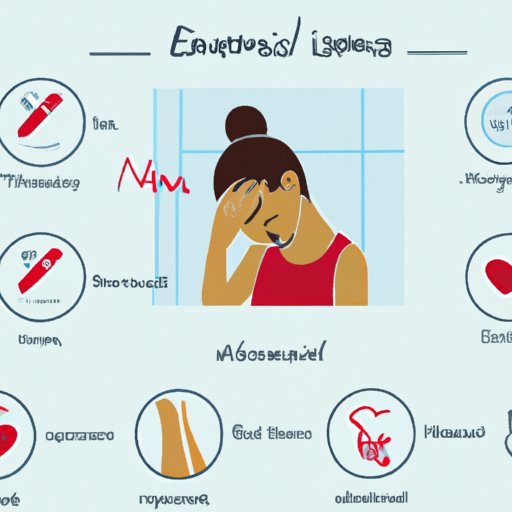Introduction
Anemia is a medical condition in which the number of red blood cells (RBCs) or hemoglobin (Hb) in the body is lower than normal. It can be caused by childbirth, heavy bleeding, chronic diseases, and nutritional deficiencies, among other things. Anemia can cause serious health complications and even death if left untreated. In this article, we’ll explore the signs and symptoms of anemia, how to test for it, and potential treatments.
Monitor Your Energy Level
One of the most common signs of anemia is feeling tired and exhausted all the time. If you find yourself feeling fatigued after activities that used to be easy, such as climbing a flight of stairs or going for a walk, it could be an indication of anemia. This is because when you are anemic, your body doesn’t have enough oxygen-rich red blood cells to carry oxygen throughout your body and provide energy.
Fatigue can also be caused by stress, sleep deprivation, and certain medications. If you are experiencing fatigue, it’s important to talk to your doctor and get tested for anemia.
Watch for Paleness in Skin and Nails
Another sign of anemia is paleness in your skin and nails. When you have anemia, your body is not producing enough RBCs to carry oxygen throughout your body. This lack of oxygen causes the skin to look pale, especially around the lips and nails. If you notice that your skin has become paler than usual, it could be a sign of anemia.
In addition, pale fingernails and toenails can indicate anemia. Fingernails can appear more yellowish or slightly blue in color due to the lack of oxygen in the blood.

Check for Shortness of Breath
Shortness of breath is another possible symptom of anemia. When your body does not have enough oxygen-rich blood, it can cause difficulty breathing. This can be especially noticeable during physical activity, such as running or exercising.
It’s important to note that shortness of breath can also be caused by other medical conditions such as asthma, COPD, and heart disease. If you are experiencing shortness of breath, it’s important to talk to your doctor to determine the cause.
Look Out for Headaches
Headaches are another common symptom of anemia. When the body doesn’t have enough oxygen-rich blood, it can cause headaches. These headaches can range from mild to severe and can occur anywhere from once a week to multiple times a day.
It’s important to note that headaches can also be caused by dehydration, stress, and certain medications. If you are experiencing frequent headaches, it’s important to talk to your doctor to determine the cause.
Monitor Your Heart Rate
If you have anemia, you may experience a rapid heart rate. This is because when the body does not have enough oxygen-rich blood, it must work harder to pump blood throughout the body. As a result, the heart rate increases in order to compensate for the lack of oxygen.
A rapid heart rate can also be caused by stress, anxiety, and certain medications. If you are experiencing a rapid heart rate, it’s important to talk to your doctor to determine the cause.
Conclusion
Anemia is a serious medical condition that can lead to serious health complications if left untreated. If you are experiencing any of the signs and symptoms of anemia, it’s important to talk to your doctor. Your doctor will be able to perform a blood test to confirm whether or not you have anemia. If you are diagnosed with anemia, there are various treatment options available, including iron supplements, dietary changes, and medications.
(Note: Is this article not meeting your expectations? Do you have knowledge or insights to share? Unlock new opportunities and expand your reach by joining our authors team. Click Registration to join us and share your expertise with our readers.)
